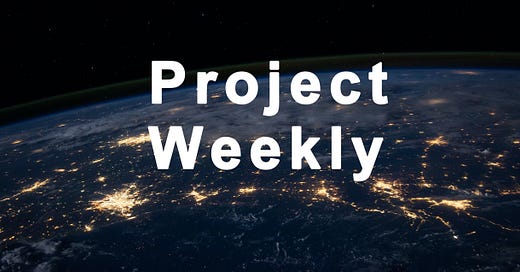Weekly Project Updates: OpenSea to Launch New Platform in December, ZKSync Initiates Voting on First Incentivized Governance Proposal, HashKey's Platform Token (HSK) Set for Upcoming Listing, etc
1. OpenSea CEO: Platform to be “Rebuilt from Scratch” One Year After 2.0 Release link
OpenSea CEO Devin Finzer tweeted that after one year since the release of OpenSea 2.0, the platform will be “rebuilt from the ground up.” The new version is set to launch in December. Data from The Block reveals that OpenSea’s overall trading volume is at its lowest level in over three years. Previously, OpenSea laid off half of its staff in 2023.
2. Synthetix Approves Major Governance Proposal to Restructure SNX Tokenomics and Reacquire Kwenta Frontend link
Synthetix has announced a large-scale “relaunch” plan that includes a restructuring of tokenomics, the introduction of an SNX-backed stablecoin, and expansion to the Ethereum and Solana blockchains. The recently approved SIP-411 proposal authorizes the buyback of Synthetix’s frontend, Kwenta, and its reintegration into the Synthetix ecosystem. Under this proposal, KWENTA token holders can exchange their tokens for SNX at a 1:17 ratio. The exchanged SNX will be locked starting November 15 for a three-month period, followed by a nine-month linear vesting period, after which the KWENTA token will be phased out.
3. MakerDAO Retains Sky Brand with 80% Support from Four Key Voting Entities link
After facing opposition from some community members, MakerDAO held a vote to uphold its recent rebranding decision. Nearly 80% of the votes favored retaining “Sky” as the protocol’s brand. According to Sky’s voting data, roughly four entities among approximately 20 voting entities accounted for almost the entirety of the supporting votes, each holding around 20% of the total. Only one large entity opposed the proposal.
4. Jito Labs Leads MEV Protocol Revenue in October with $78.92 Million link
Jito Labs’ protocol revenue for October reached $78.92 million, doubling the record of $39.45 million set in May, surpassing both Lido and Uniswap to become the leading MEV-focused protocol in terms of income. Its dedicated MEV infrastructure and the liquid staking token, JitoSOL, combine staking rewards with MEV earnings, solidifying Solana’s position in retail transactions and emerging token markets such as memecoins. The continued high transaction volume on Solana may determine the sustainability of these income levels.
5. ZKSync’s First Governance Proposal Begins Voting, Plans 325 Million ZK Token Distribution Over Nine Months link
ZK Nation has announced that the first governance proposal for ZKsync, TPP-001 (the ZKsync Ignite Program), is now in the voting phase, with a standard voting period of seven days. Currently, support for the proposal stands at an impressive 97.1%, with Syncswap contributing 26.94% of the affirmative votes. The proposal outlines a plan to distribute a total of 325 million ZK tokens over nine months, with 300 million allocated to users to establish a DeFi liquidity hub on ZKSync’s elastic chain.
6. Ink Undergoes Stress Testing in Preparation for Testnet Launch link
The cryptocurrency exchange platform Kraken’s network, Ink, announced via Twitter that it is conducting stress tests for Ink in preparation for the official testnet launch. Early access to the testnet is now available on Discord. Previously, Ink founder Andrew Koller stated that the testnet is expected to go live by the end of the year, with the mainnet set to open to retail and institutional users in the first quarter of next year.
7. Avalanche Foundation Completes Buyback of AVAX Tokens Held by Luna Foundation link
The Avalanche Foundation announced the completion of its buyback of 1.97 million AVAX tokens held by the Luna Foundation, valued at approximately $52 million, formally ending its partnership with the collapsed Terra blockchain. This buyback received bankruptcy court approval, concluding the Foundation’s token redemption plan following Terra’s failure. The Avalanche Foundation intends to allocate these funds toward community incentives, technology incubators, and ecosystem development, supporting the continued growth and innovation of the Avalanche network.
8. HashKey Platform Token (HSK) Set to Go Live on HashKey Global link
The HashKey platform token (HSK) will officially be listed on HashKey Global. HSK/USDT spot trading will begin on November 26, 2024, at 10:00 UTC, with HSK withdrawals opening on November 27, 2024, at 10:00 UTC. Deposits for HSK will be available starting November 7, 2024, at 07:00 UTC+8. HSK serves as the platform token for the HashKey Group, supporting all HashKey services, including compliant exchanges, investment and asset management, tokenization, and infrastructure services. Additionally, HSK functions as both the native and gas token for the Layer 2 public blockchain, HashKey Chain.
9. JPMorgan Blockchain Platform Rebrands as Kinexys to Advance Tokenization of Real-World Assets link
JPMorgan has renamed its blockchain platform Onyx to Kinexys, aiming to further advance the tokenization of real-world assets. The platform is designed to enable multi-chain interoperability and enhance the efficiency of the financial system. Since its inception in 2020, Kinexys has processed over $1.5 trillion in transactions. JPMorgan plans to introduce on-chain foreign exchange capabilities to Kinexys in early 2025, initially supporting the US dollar and the euro, paving the way for 24/7 multi-currency clearing and settlement.
10. Hamster Kombat Loses 260 Million Players in Three Months link
Telegram’s “play-to-earn” game, Hamster Kombat, which boasted 300 million users in August, has seen a dramatic decline in its monthly active users, now reduced to approximately 41 million, with over 260 million players lost. The game’s token, HMSTR, has plummeted by 76% since its peak of $0.009993 on September 26, now trading at just $0.002392. Despite Telegram’s CEO once calling it “the fastest-growing digital service globally,” the game’s crude AI graphics and monotonous gameplay failed to retain players. Frequent delays in airdrops and the implementation of a stringent anti-cheat system led to the banning of 2.3 million users and the confiscation of 6.8 billion HMSTR tokens. Additionally, Hamster Kombat has faced criticism from the governments of Iran and Russia, who argue that it has a negative social impact.
Follow us
Twitter: https://twitter.com/WuBlockchain
Telegram: https://t.me/wublockchainenglish




